Texans’ nuanced views on abortion access are at odds with binary political labels – and with the state’s ban on abortion
The passage of Texas’s highly restrictive and uniquely punitive anti-abortion laws in 2021 raised questions about the breadth of support for banning access to abortion, especially among Republican voters who had elected the lawmakers who ensured passage of the legislation and the Republican governor who proudly signed it into law. The Supreme Court’s overturning of Roe v. Wade in the Dobbs decision the next year raised the stakes of answering a series of questions already hanging over Texas: Do Republican voters, aligned with a party officially declared as “pro-life,” categorically support a universal (or even near universal) ban on abortion like the state is now enforcing, and must at least to some extent own in the 2024 election? Among Democrats, does the party’s official identification as the “pro-choice” party align sufficiently with Democratic voters’ situational judgments about abortion access at a time that many Democratic strategists and officials see abortion as a potential mobilization issue in the 2024 election?
A battery of questions in the latest University of Texas/Texas Politics Project Poll, and years of data on abortion attitudes in the state, suggest that voters view access to legal abortion with much more nuance than either our inherited labels or the monolithic positions adopted by the two parties admit. While this nuance is bipartisan, the lack of absolutist views is most notable, and most consequential, among Republican voters whose candidates must claim credit, or take blame, for engineering the rollback in abortion rights that is the new political reality in the U.S. – especially in Texas.
While it’s a straw man to describe either party (or their partisans) to be monolithic in its embrace and application of “pro-lilfe” and “pro-choice” orientations, the extent that voters’ attitudes actually diverge from the unbending implications of these binary labels matter for clarifying voters’ understanding of and positions on abortion policy. Philosophical and (especially) legal assertions about when personhood “begins” – which post-Dobbs have had seemingly unintended consequences for medical practices like in-vitro fertilization and related procedures – are also subject to more situational judgements by Texas voters that may affect the positions of both parties in the upcoming election should abortion be a prominent campaign issue.
If Republican elected officials and candidates, either directly through legislation or indirectly through their support for judicial appointees and their decisions, have overreached in enabling states to effectively ban abortion and potentially facilitate civil and criminal punishments for anyone who is a party to an abortion, they face a potential backlash not only from their usual opponents, but also from some of their presumably “pro-life” base.
If Democratic elected officials and candidates are assuming that they can leverage Republican overreach to mobilize their pro-choice base, their ability to use the issue in the 2024 election will be conditioned by just how expansive pro-choice voters think access to abortion should be for pregnant women — and in turn, how much Democratic candidates do, or do not, embrace some abortion limits within their push to expand rights and access.
In short, both parties face challenges with respect to abortion in the 2024 election having to do with perceptions about their base voters and a reality that has been made much more complicated by Roe’s reversal in Dobbs.
Abortion labels and views of abortion policy in Texas
To be clear, there has always been evidence of variance in the Texas voters’ abortion attitudes — and, more consequentially, a degree of misalignment between Texas’ increasingly strict abortion laws enacted throughout the 2010s and into this decade, and public opinion about those laws. While the impact of Dobbs on the landscape of legal access has been seismic, Texans’ baseline abortion attitudes have not changed dramatically in the intervening years. This should come as no surprise: attitudes about abortion tend to be well-informed (relative to other political attitudes) and reinforcing. Neither a conservative, evangelical Christian, Republican, or a progressive, determinedly secular Democrat are unlikely to find any conflict in each of those identities when it comes to their abortion attitudes, and, if anything, the ideological, moral/theological, and partisan attitudes can be expected reinforce each other, especially when adopting thumbnail positions without being required to make specific, more complex situational judgments, as we’ll see below.
While the share of voters in Texas who identify as “pro-life” and “pro-choice” hasn’t changed much, if at all, in the wake of Dobbs, voters’ attitudes towards Texas’ abortion laws have shifted in response to how those laws have changed. Between April 2021 and April 2024, the share of Texas voters who said the state’s abortion laws should be “less strict” increased from 33% to 45%. Given little reason to expect major shifts in Democratic attitudes towards Texas’ already strict abortion laws, it’s notable that the share of Texas Republicans who said they wanted more strict abortion laws declined from 55% in April 2021 to 26% three years later. While the share who want them less strict increased from 9% to 26% over the same period.
How then, can we square an electorate simultaneously unbending in their seemingly relevant identifications as pro-life and pro-choice with shifts in their attitudes about Texas’ abortion laws? The polling data indicate that in both the pro-life and pro-choice camps, there tends to be a lot more nuance than simple, binary, and absolutist conceptions of either might imply. Roe v. Wade, in more than one way, codified the nuance apparent in voters’ abortion attitudes, both with respect to timing (when a legal abortion could be accessed) and voters’ flexibility in response to the particular circumstance a pregnant person might be facing — at least early in a pregnancy.
A battery of questions the UT/TxPP poll has asked repeatedly about the time a woman should be allowed to have a legal abortion given seven different circumstances helps illustrate the nuance with which Texans approach questions about abortion access. For each of the seven circumstances, listed below, voters are asked whether a woman should “never” be allowed to obtain a legal abortion, be able to obtain one within the first 6 weeks of pregnancy, within 12 weeks, within 24 weeks, within 36 weeks, or at any time during the pregnancy (with the option to say that they don’t know or have no opinion).
- The woman’s health is seriously endangered.
- The woman became pregnant as a result of rape.
- The woman became pregnant as a result of incest.
- There is a strong chance of a serious birth defect.
- The family has very low income and cannot afford any more children.
- The woman is not married and does not want to marry.
- The woman is married and does not want any more children.
While this set-up sounds complicated, the overall results presented in grid form, if not exactly simple, reveal a fairly clear general pattern in overall responses. Notwithstanding variations within different subgroups, support for access to abortion declines as the duration of a pregnancy advances, and also declines when the circumstances of a pregnant woman seeking access are shaped by, broadly speaking, elective judgments such as personal circumstance rather than crisis situations that have become the focus of the post-Dobbs blanket prohibitions in Texas, such as health threats, rape, and incest, and, importantly, the presence of a serious birth defect.
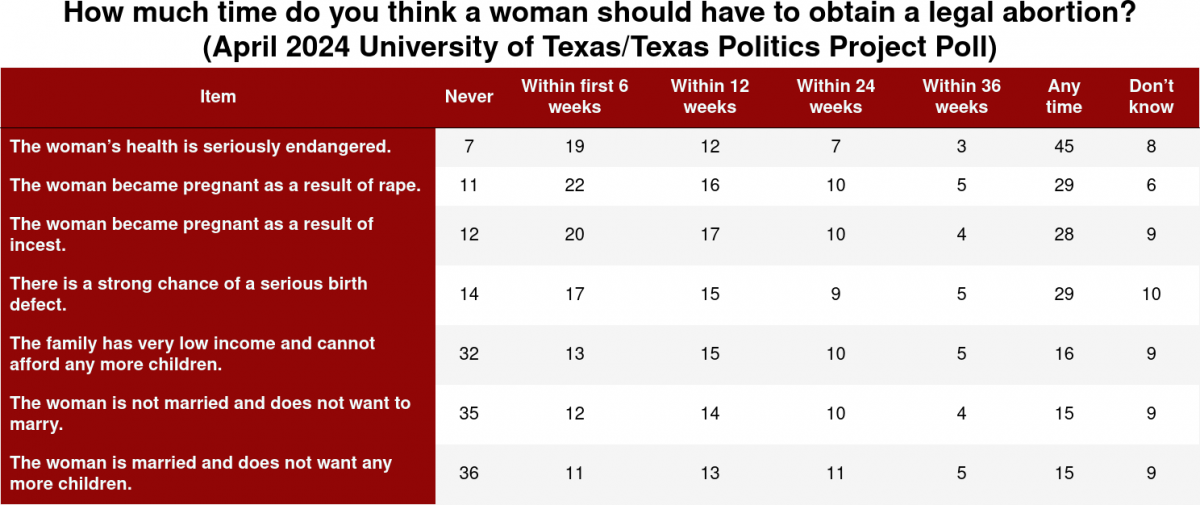
Cell entries are percent of total responses. Poll information: Field Dates April 12-21, 2024; N=1200 registered voters, MOE +/- 2.83% for full sample.
The first three circumstances (health, rape, and incest) enjoy near universal support for some access from Texas voters, and therefore, stand somewhat apart from the other circumstances. The strong chance of a serious birth defect is an issue that tends to generate significant openness to legal access, though less than is the case for health reasons, rape, or incest. The final three circumstances might be described as having more “choice” involved, in that they have to do with a lack of financial resources, the pregnant person being unmarried, and the pregnant person being married and not wanting any more children. For these three “choice” circumstances, we see significantly less support in the electorate.
The views of pro-life and pro-choice voters exhibit a lot of variance clearly not dictated by their general positions in response to these circumstances. But taken on the whole, the majority of Texas voters support some legal access to abortion in each of the seven circumstances.
When abortion is acceptable for pro-life voters, proponents of fetal personhood
Self-identified “pro-life” voters make up a majority of Republican voters (58%), and, conversely, overwhelmingly identify as Republican (70%), making them a key constituency for changes in abortion laws implemented in Texas over more than two decades of Republican governance – including the 2021 legislation that effectively banned access in the state. Among the 38% of voters who identified as “pro-life” in the April 2024 UT/TxPP poll, 14% said that they would “never” allow legal access to abortion in each of the 7 circumstances listed above. If we remove the circumstance in which a woman’s health is seriously endangered given the conflict it might trigger with a literal “pro-life” orientation, 19% of pro-life voters would prohibit any access in the remaining 6 circumstances.
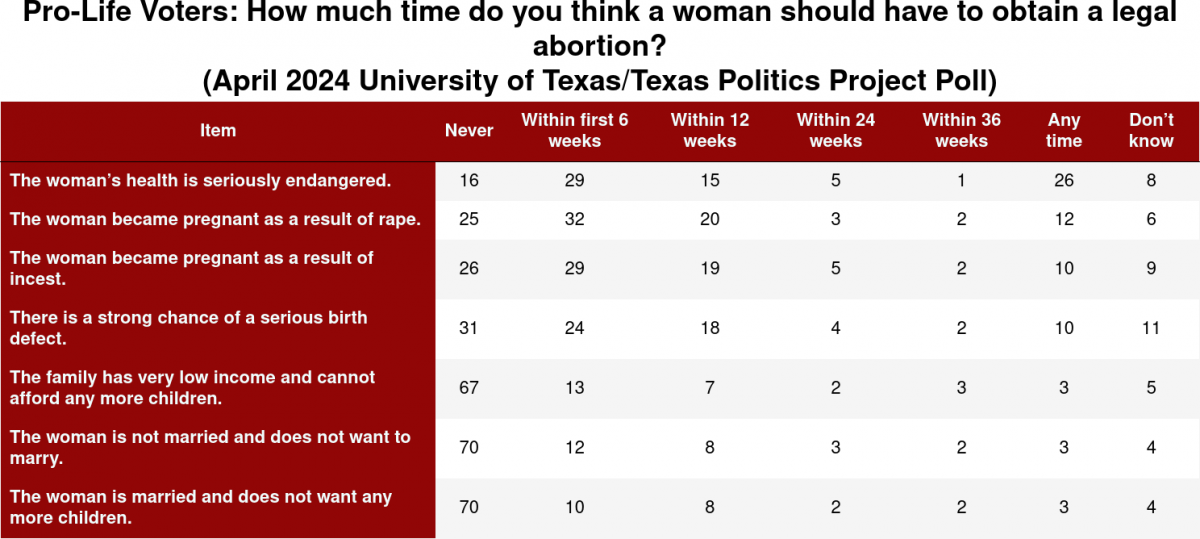
Cell entries are percent of total responses. Poll information: Field Dates April 12-21, 2024; N=1200 registered voters, MOE +/- 2.83% for full sample.
The interacting impact of timing and circumstances evident in the overall results also manifest among “pro-life” voters in ways that belie the notion that absolutes often associated with the “pro-life” movement prevail among all voters who embrace the label. For example, more “pro-life” voters would allow some legal abortion access than would prohibit it entirely in 4 of the 7 circumstances: health (16% never; 76% at some point during the pregnancy); rape (25% never; 69% at some point); incest (25% never; 65% at some point); and the detection of a serious birth defect (31% never; 58% at some point). Between 67% and 70% of “pro-life” voters would prohibit all access in the three “choice” circumstances; but between 25% and 28% would allow for legal access at some point during the pregnancy in each of these circumstances as well.
So the “pro-life” identifier, while certainly meaningful, does not consistently signify unbending support for all abortion restrictions. These voters may see their pro-life identity as more or less proximate to their political identity and attitudes – but many do so without being beholden to a blanket prohibition on access to abortion at all times and under every circumstance. Most pro-life voters say they would allow abortions in crisis circumstances. Support plummets in situations that rely more on a woman's judgments outside of crisis conditions (and generally as a pregnancy progresses, as with all voters), though a quarter or more of these voters would still allow for some legal access.
To consider another dimension of the attitudes of voters presumably committed to limiting or eliminating abortion, we asked voters whether they think constitutional rights and protections should begin at conception. Here, the plurality of Texans, 40%, say that these rights do begin at conception, close to the 38% who identify as pro-life.
Once again, when asked about specific circumstances, however, we find a lot more variance in the views of ostensible supporters for fetal personhood.
Only 12% of those voters who support the granting of fetal rights at conception said that abortion should never be permitted in each of the seven circumstances. Like pro-life voters, potential fetal rights supporters were more likely to endorse some access to legal abortion than prohibit it in the case of health (15% never; 77% at some point during the pregnancy); rape (23% never; 72% at some point); incest (24% never; 68% at some point); and the possibility of a serious birth defect (29% never; 63% at some point). In these circumstances, similar shares, about 30%, would only allow for abortion in the first 6 weeks as would allow for abortion somewhere between 12 and 36 weeks. Majorities between 53% and 58% would prohibit abortion in the three “choice” circumstances, but 39% to 43% would allow some access, mostly earlier in the pregnancy.
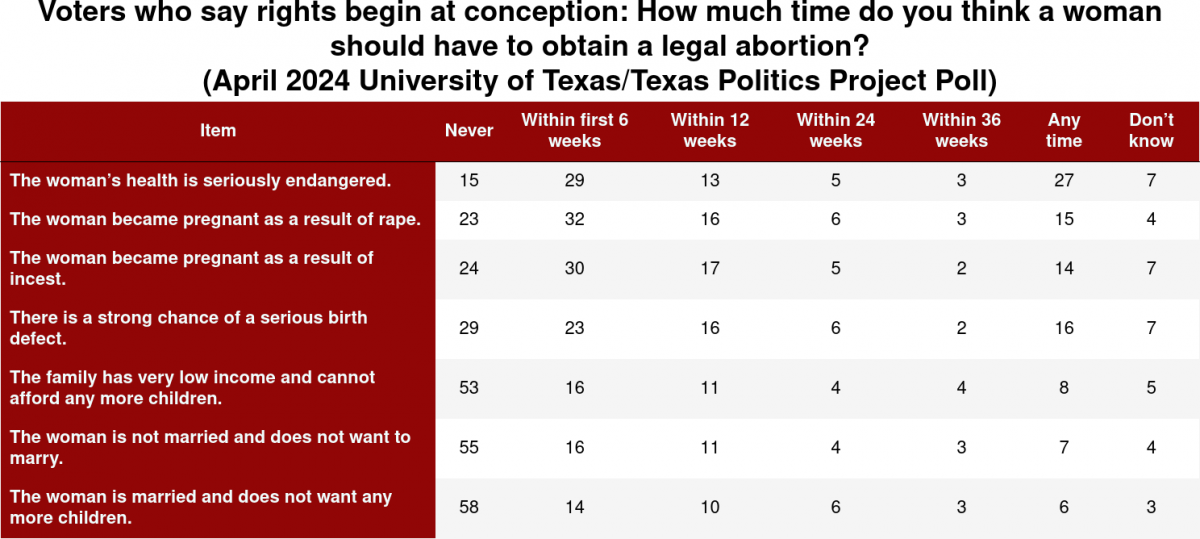
Cell entries are percent of total responses. Poll information: Field Dates April 12-21, 2024; N=1200 registered voters, MOE +/- 2.83% for full sample.
The above data make abundantly clear that there is significant nuance in the views of “anti-abortion” voters that make room for pregnant women to access abortion in a variety of circumstances while not endorsing unlimited, universal access. While a significant share of voters have endorsed the provision of rights to the unborn at the moment of conception, these results show that when forced, even implicitly, to balance the rights of the unborn with the rights of a living, pregnant person, there appears to be a lot more consideration of the latter than the endorsement of Constitutional rights for the unborn would imply.
When Pro-Choice Voters, Democrats are open to limitations on abortion
“Pro-choice” voters in the electorate also display a fair amount of nuance with respect to their views on access to legal abortion in different circumstances, belying the notion that all pro-choice voters (or by frequent implications, all Democrats) definitionally endorse abortion-on-demand up to the point of childbirth.
Among pro-choice voters, who made up 41% of the April UT/TxPP Poll sample, fewer than 9% would prohibit all access to abortion in each of the 7 circumstances listed. While this is unsurprising, the data also uncovers widespread willingness to enact some time limits across each of the seven circumstances, albeit with significant variance depending on the circumstance.
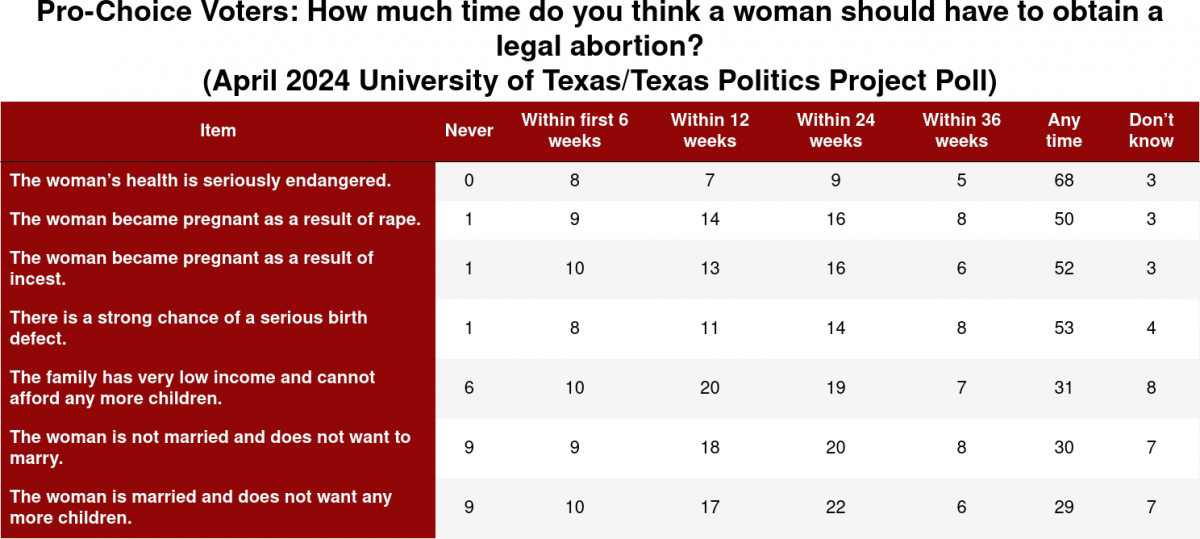
Cell entries are percent of total responses. Poll information: Field Dates April 12-21, 2024; N=1200 registered voters, MOE +/- 2.83% for full sample.
In the case of a health emergency, 29% of pro-choice voters would allow for some time limits on access, while 47% would in the case of rape, 45% in the case of incest, and 41% in the case of a serious birth defect. In response to the choice circumstances, majorities of pro-choice voters (between 55% and 56%) would allow for some time limits on when a woman could obtain a legal abortion.
This pattern repeats among all Democratic voters, with fewer than 16% saying that a woman should “never” be allowed to obtain an abortion in each of the 7 circumstances, but again, 33% would allow for some access limits in the case of a serious health emergency; 47% in the case of rape; 45% in the case of incest; and 43% in the case of a serious birth defect. Between 49% and 51% would allow for some limits on access in the three choice circumstances. The share saying that a woman should be able to have a legal abortion at any point during the pregnancy ranges from 26% to 60% among Democrats, depending on the circumstance.
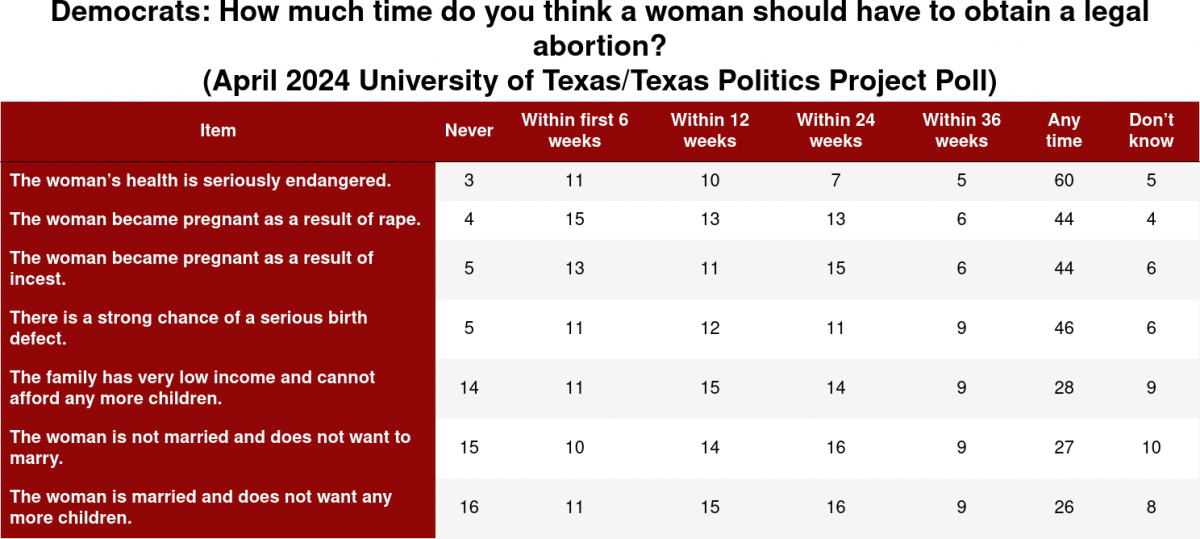
Cell entries are percent of total responses. Poll information: Field Dates April 12-21, 2024; N=1200 registered voters, MOE +/- 2.83% for full sample.
Even among voters who said that the current abortion laws should be made less strict in the April poll (45%), between 29% (in the case of a health emergency) and 53% (in the case of the choice circumstances) would allow for some limitations on access.
Nuanced abortion views and blunt general election politics in Texas
Texas public opinion supports arguments that the highly restrictive abortion policies delivered indirectly by a Supreme Court engineered by activists and their Republican proponents in the White House and U.S. Senate to overturn Roe v. Wade, and directly by Republican-led state governments, have overreached a Republican electorate that prefers limited access to abortion, but is largely opposed to absolute bans.
If Republican leaders in Texas oversteered, it’s for familiar reasons. Coalitional politics in which pro-life groups significantly shape increasingly competitive legislative primaries incentivizes Republican candidates to cater to the views of sub-slices of their coalition who hold the most conservative views from among their partisan base. The overwhelming preponderance of non-competitive general election races provides no effective check on candidates who compete to demonstrate their commitment to promote policies that mollify interest groups, ideologically extreme primary voters, and social media trolls, but that don’t align with the positions of most voters in their party (let alone the broader electorate). If Republican voters, and even pro-life voters in particular, hold much more nuanced views about abortion access than simple labels would suggest, as UT/TxPP data clearly demonstrates, talking about abortion access, and in particular, its (re)expansion, to a general election audience is rocky political terrain for Republican candidates who must face primary voters again in the next election cycle. Herein lies a big incentive for Democrats to attempt to force Republicans into this conversation.
Democrats face challenges as well. While less impactful on policy due to their entrenched status as the party out of power, Democratic candidates and legislators are similarly beholden to voters unlikely to reward a potential nominee who takes the nuanced road on an issue that few are likely to view with much subtlety given the current state of abortion access in Texas. In particular, Democratic candidates wanting to talk about abortion will have to decide whether they are going to verbalize some limits on abortion access (temporal or circumstantial) in line with their party’s voters, often painted, inaccurately, as pro-choice up to the point of birth. Without some nuance, Democrats have historically been put on the defensive. Terms like “late-term” and “partial birth abortion” have given way to much more graphic and provocative language, which Republican campaign rhetoric will readily deploy should Democratic candidates push for any restoration of access to legal abortion.
The presence of nuanced attitudes in both parties or on both “sides” of the abortion debate notwithstanding, the shift in the national legal landscape and the subsequent removal of nearly all access in Texas has put Republicans in a tougher position than Democrats. Looking just at the three choice circumstances, 54% of Republicans would allow some time for abortion access in at least one of the three, including 53% of self-identified conservatives. Voters who identify as “extremely conservative” make up the only group in which a majority (65%) endorses no exceptions for each of the three choice circumstances (65%). This group makes up about 25% of the electorate and a larger but still relatively small share of Republican voters overall (31% in April polling).
Republican policy makers and opinion leaders own Texas abortion laws which remain demonstrably out of alignment with the views of a large share of their partisans when those voters are faced with the real-world situations that are frequently elided or misrepresented when Republican lawmakers defend the laws they have implemented. Democratic candidates should have an easier time managing the less widespread tensions and qualifications within the pro-choice coalition, which by definition has more room to maneuver within the conditions in which women make choices about pregnancy and child-bearing. But they need to have willing candidates, resources, and the strategic capabilities to press this advantage in a campaign in which Republicans are using their far-superior resources to avoid making a campaign issue out of the states’ abortion restrictions – even though most of their voters don’t want what many of them worked for so long and so hard to deliver.
